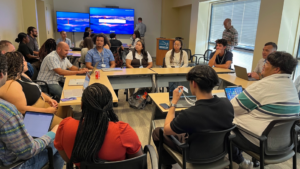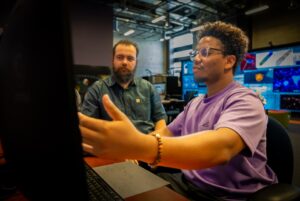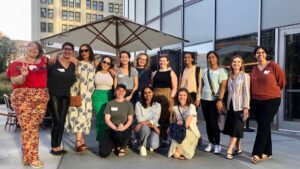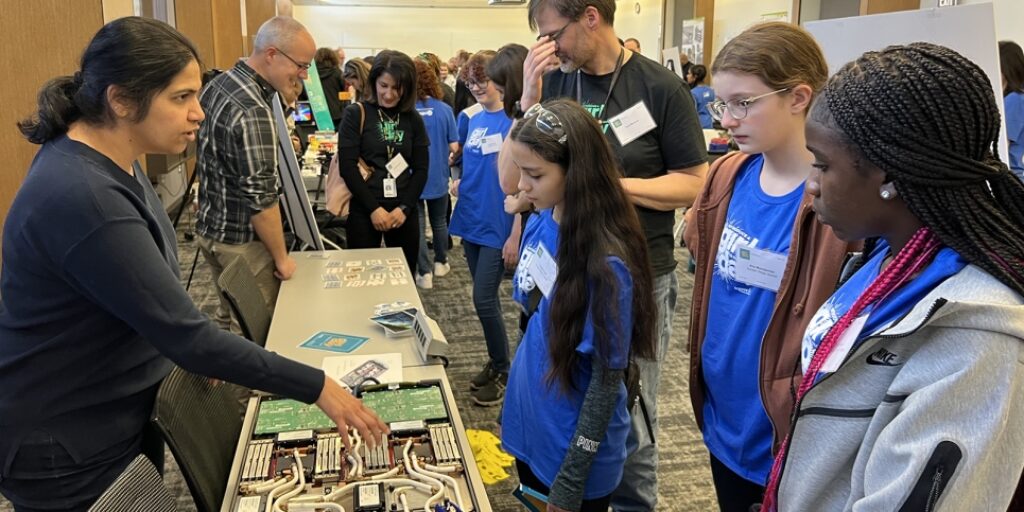The ALCF is engaged in several activities and initiatives that aim to increase diversity in HPC and the computing sciences.
Supercomputing centers have long been recognized for driving innovation and progress in scientific fields, but they are also known for similar achievements in the field of high-performance computing (HPC) itself.
It is the workforce of the Argonne Leadership Computing Facility (ALCF), and other centers like it, that propel such achievements. Computer scientists and other specialists do the work to modify the open-source compilers and libraries used by the scientific community, help scientists get their codes to work on the machines, and develop services that allow researchers to effectively use the machines and move large datasets around. The ALCF is a U.S. Department of Energy (DOE) Office of Science user facility at DOE’s Argonne National Laboratory.
The ALCF enhances creativity and productivity in the HPC domain by ensuring a more inclusive and diverse workforce. For the ALCF, this involves collaborating with colleagues from the HPC community to develop strategies for attracting people from underrepresented groups, organizing student camps to inspire young people to pursue STEM careers, and participating in outreach programs that promote diversity in the HPC field.
Michael E. Papka, director of the ALCF and a professor of computer science at the University of Illinois Chicago, believes in the positive impact that a diverse workforce can have on the HPC field. “In our everyday work we see the benefits of having individuals with different backgrounds and perspectives working together to solve complex problems,” said Papka. “But that doesn’t happen on its own.”
Broadening Participation

ALCF’s Alvaro Vazquez-Mayagoitia leads a breakout session at the 2023 Intro to HPC Bootcamp.
Argonne is highly involved in the DOE Exascale Computing Project’s Broadening Participation Initiative. This collaborative, multi-lab effort is working to establish a sustainable plan to recruit and retain a diverse HPC workforce by creating a supportive and inclusive culture within the computing sciences at DOE national laboratories. The initiative involves three complementary thrusts, or focus areas, that bolster such efforts in the HPC community.
ALCF leads the Intro to HPC thrust, which focuses on developing training materials to educate newcomers to HPC. Many undergraduate institutions lack comprehensive training in HPC. As a solution, the Intro to HPC group is collaborating with DOE lab communities to identify important HPC topics and create educational materials that effectively convey them. The team is also working with universities to provide students with direct access to these materials. In August, the group hosted the Intro to HPC Bootcamp, a weeklong training program that allowed undergraduate and graduate students to work on energy justice projects while learning about the fundamentals of HPC such as parallel computing, job scheduling, and data analysis techniques.
“This boot camp aims to provide participants with a sense of community and belonging within the HPC and DOE communities,” said Paige Kinsley, ALCF’s education outreach lead. “We hope it will help them discover more opportunities as they advance in their studies and careers. Interactions with fellow students, peer mentors, and DOE personnel will expose them to various fields, tools, and occupations that they may have not previously considered.”
The ALCF team is also contributing to the two other Broadening Participation thrusts: the HPC Workforce Development and Retention Action Group, and Sustainable Research Pathways for HPC. The action group shares best practices and develops recommendations and strategies for improving the workforce pipeline through webinars and other outreach materials. Sustainable Research Pathways is an internship and mentoring program that pairs students with ECP teams at different institutions, including ALCF, to work on a variety of projects across application development, software technologies, and computing facilities.
Student Outreach

James Morrissette (right) first began working with ALCF mentor Victor Mateevitsi as a high school student participating in the Argonne ACT-SO program. In 2023, he returned to the ALCF as a college intern through the Sustainable Research Pathways program. Image: Argonne National Laboratory
The ALCF is also working to strengthen the workforce pipeline by leading and contributing to various educational and outreach programs for students, including summer camps and internship opportunities. These efforts help to introduce students to Argonne scientists and the mission-driven, high-impact research conducted at the lab and beyond, giving them a glimpse of what a career in STEM looks like.
The facility helps put on several Argonne computing camps for middle school and high school students each year, including the CodeGirls@Argonne Camp. Aimed at teaching the basics of coding, the camp allows sixth and seventh-grade students to try out creative and computational thinking through hands-on activities with Argonne mentors. ALCF staff members also regularly contribute to Argonne’s annual Introduce a Girl to Engineering Day and Science Careers in Search of Women events. These events connect Argonne scientists with young women to introduce them to research at the lab as well as potential STEM career paths.
Janet Knowles, an ALCF computer scientist, believes introducing girls to computer science at a young age is crucial to normalizing women in technology. “We want to ensure that our absolute brightest minds are solving the world’s toughest problems by increasing our pool of talent,” said Knowles.
As part of Argonne’s ACT-SO (Afro-Academic, Cultural, Technological & Scientific Olympics) High School Research Program, ALCF staff members mentor local high school students participating in the regional DuPage County ACT-SO competition. With a mission to support the development of a diverse, talented workforce, the program pairs students with Argonne mentors for research projects that use the lab’s facilities and resources.
At the college level, the ALCF is reaching the next generation of AI practitioners through its “Intro to AI-driven Science on Supercomputers” training series. Aimed at undergraduate and graduate students, the series teaches attendees the fundamentals of using AI and supercomputers for scientific research. Comprised of eight virtual classes, the 2022 program welcomed over 200 attendees from 90 universities for hands-on instruction using AI training and neural networks on ALCF supercomputers.
Increasing Diversity at the ALCF and Beyond

The Chicago Women in HPC group, launched by Argonne and the University of Illinois Chicago, held their first gathering in 2023. Image: Argonne National Laboratory
The ALCF maintains a presence at many computing conferences and events to communicate career opportunities and recruit new team members. The facility continues to have a presence at the annual Grace Hopper Celebration, an event that brings the research and career interests of women in computing to the forefront. ALCF staff also regularly attend the Richard Tapia Celebration of Diversity in Computing Conference, an annual event that seeks to bring together undergraduate and graduate students, faculty, researchers, and professionals in computing from all backgrounds and ethnicities to strengthen diversity in computing.
To provide a local resource and network for women interested in HPC, the ALCF collaborated with the University of Illinois Chicago to form a new Women in High-Performance Computing (WHPC) chapter, called Chicago Women in HPC. The chapter aims to increase the participation of women in the HPC field, provide resources for women in HPC careers, and mentor students considering professional career paths in computing. In August, Chicago Women in HPC hosted its first networking event to connect women in the Chicagoland area.
Together, these activities and initiatives are helping the ALCF to establish a diverse, inclusive work environment and talent pipeline that will fuel future innovations in HPC and the computing sciences.
I AM HPC at SC23
If you’re attending #SC23, catch these talks to hear more about how Argonne, our fellow national labs, and the Exascale Computing Project are working to increase diversity in HPC.
- Argonne’s Valerie Taylor at the opening plenary, “I Am HPC: Impact and Future Directions” on Monday, November 13
- Argonne Guest Researcher George K. Thiruvathukalis the session chair for EduHPC-23: Workshop on Education for High Performance Computing from 1:30-5:30pm on Monday, November 13
- Argonne’s Bethany Lusch and Nwamaka Okafor will present at the WHPC Workshop at 2:30pm on Monday, November 13
- Mary Ann Leung of Sustainable Horizons Institute will give an overview of DOE’s Intro to HPC Bootcamp at 12:15pm on Wednesday, November 15
- Argonne’s Lois Curfman McInnes will present in the BOF, “Meeting HPC Community Needs: How SIGHPC, TCPP, and SIAG-SC Join Efforts to Engage Communities and Deliver Services” at 9:20am on Thursday, November 16
- Argonne’s Lois Curfman McInnes will give an invited talk, “Broadening Participation in HPC: Together We Can Make a Difference” at 9:20am on Thursday, November 16




